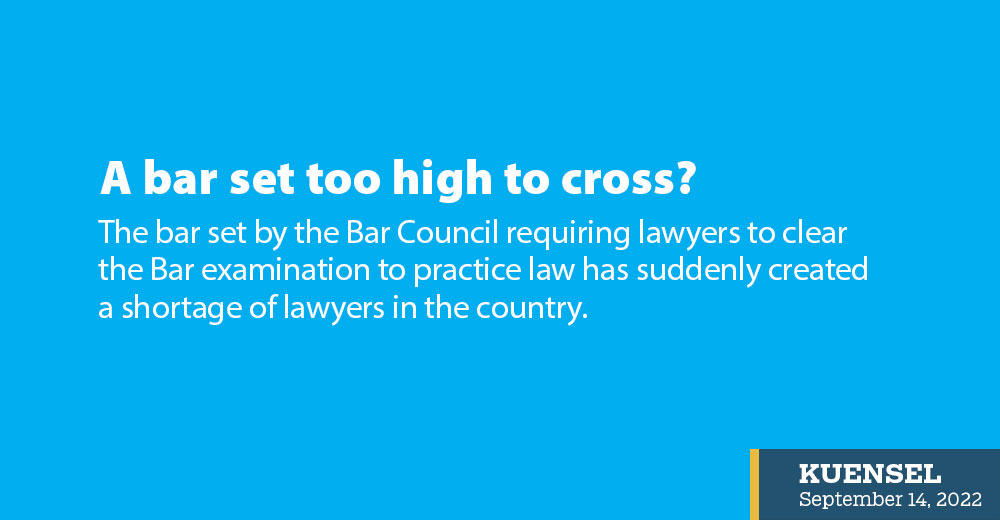Rinzin Wangchuk
The bar set by the Bar Council requiring lawyers to clear the Bar examination to practice law has suddenly created a shortage of lawyers in the country.
More than 135 law graduates sat the Jabmi selection examinations since 2019 but only 34 graduates have cleared the exam.
Of the 34 candidates, only one practicing lawyer from the Office of the Attorney General (OAG) cleared the recent Bar examination conducted from June 27 to 29 this year.
The Jabmi Act 2016 mandates that law graduates and those who have been practicing law after July 13, 2016, must pass the Bar examinations to practice. The Jabmi Tshogdey (Bar Council of Bhutan) awards a certificate of practice upon passing the examination. Lawyers can then appear before any court and tribunal in Bhutan.
Those who fail the exam can work only in the private law firms and institutions as paralegals (thrimdrungs).
In September 2021, the Bar Council directed that all courts across the country should accept only lawyers with bar certificate to appear before the courts. This was imposed to render professional services to clients.
However, the courts did not implement the rule strictly, according to some practicing lawyers.
Impact of Bar examinations
Several institutions, especially financial institutions, are now feeling the immediate impact with the chief justice issuing an order saying only lawyers with Bar certificate can represent an organisation in the court. “Most courts are accepting cases from the financial service providers only if it is charged-sheeted by Bar Council certificate holders,” a bank official said.
With many banks with huge non-performing loans (NPL) mulling to move courts, finding a Bar Council-certified lawyer is the immediate challenge.
Some financial institutions are now looking for lawyers certified by the Council, formerly established on May 10, 2017.
The Royal Insurance Corporation of Bhutan Limited announced five vacancies for professional lawyers although the company has six jambi certificate holders and six paralegals. “Initially, there were only two applicants and we had to announce the vacancy again,” an official from the legal department of the corporation said. “The submission of applications will close this week.”
Until now six lawyers with support from paralegals have been representing RICBL in the courts.
Kuensel also learnt that Bhutan Development Bank Limited (BDBL) is facing an acute shortage of lawyers even as the bank is trying to resolve its high NPL cases. Some resorted to head hunting for lawyers who graduated before the Jabmi Act came into force in 2016.
With only one Bar certificate holder to handle court-related loan cases, BDBL has announced vacancies for two lawyers although the bank needs four immediately.
Both BDBL and RICBL have the highest number of NPL at 21.6 percent and 22.4 percent respectively as of June 2021. Both financial institutions will have to recover their NPLs through courts which require more lawyers.
However, other financial institutions like Bank of Bhutan (BoB), Bhutan National Bank (BNB), and T Bank Ltd have enough lawyers.
Chief executive officer of BNB, Sonam Tobgay, said that the bank recruited four Bar-certified lawyers early this year. “We have 15 lawyers, including six jabmi certificate holders,” he said.
BoB’s CEO, Dorji Kadin, also said that BoB has no issue with lawyers since they have three certified lawyers and four legal assistants to deal with the loan-related cases.
TBank also has seven lawyers, including three Bar certificate holders, according to CEO Pema Tshering. Most of the legal officers with the financial institutions are paralegals who were either recruited prior to the Jabmi Act 2016 or did not sit for Bar examination.
“The big question is what to do with existing paralegals?” a bank official said. He also said that they are very proficient in writing and drafting legal applications in Dzongkha and are now experienced as well as conversant with the judicial process and relevant laws of the country.
The problem, according to the bank official, the banks recruited these people before and the later laws gave rise to the wastage of human resources.
Some opined that the Bar examination is too strict and should be designed considering the requirement of the market. One practicing lawyer said that there has to be a single examination for lawyers to enrol in the civil service as the Bar examination is entirely focused on the test of the lawyers as professionals
Meanwhile, the state prosecutor, OAG, also has an acute shortage of lawyers as many left their profession or intent to resign or apply for EOL. One official said OAG, being the parent organisation for government ministries and agencies, has been under pressure from those agencies to fill up the existing lawyer shortage.
The OAG administration is working on a mechanism to provide clustered legal services or avenues to hire contract lawyers on a case by case, according to the official.
A few corporations decided not to have legal officers as it is too financially taxing for the company. An official from Drukair Corporation Ltd. said that they do not see any issue even if they don’t have lawyers. “Because we have a law firms from where we can hire lawyers,” the official said.
A head of a corporation said that his organisation would not be able to afford hiring lawyers or law firms to represent them in courts. “Sometimes we have to move courts for Nu 20,000. How will we pay the legal fees which are always expensive ,” he said.
There are 158 lawyers in the country today, including the 50 lawyers with OAG.


